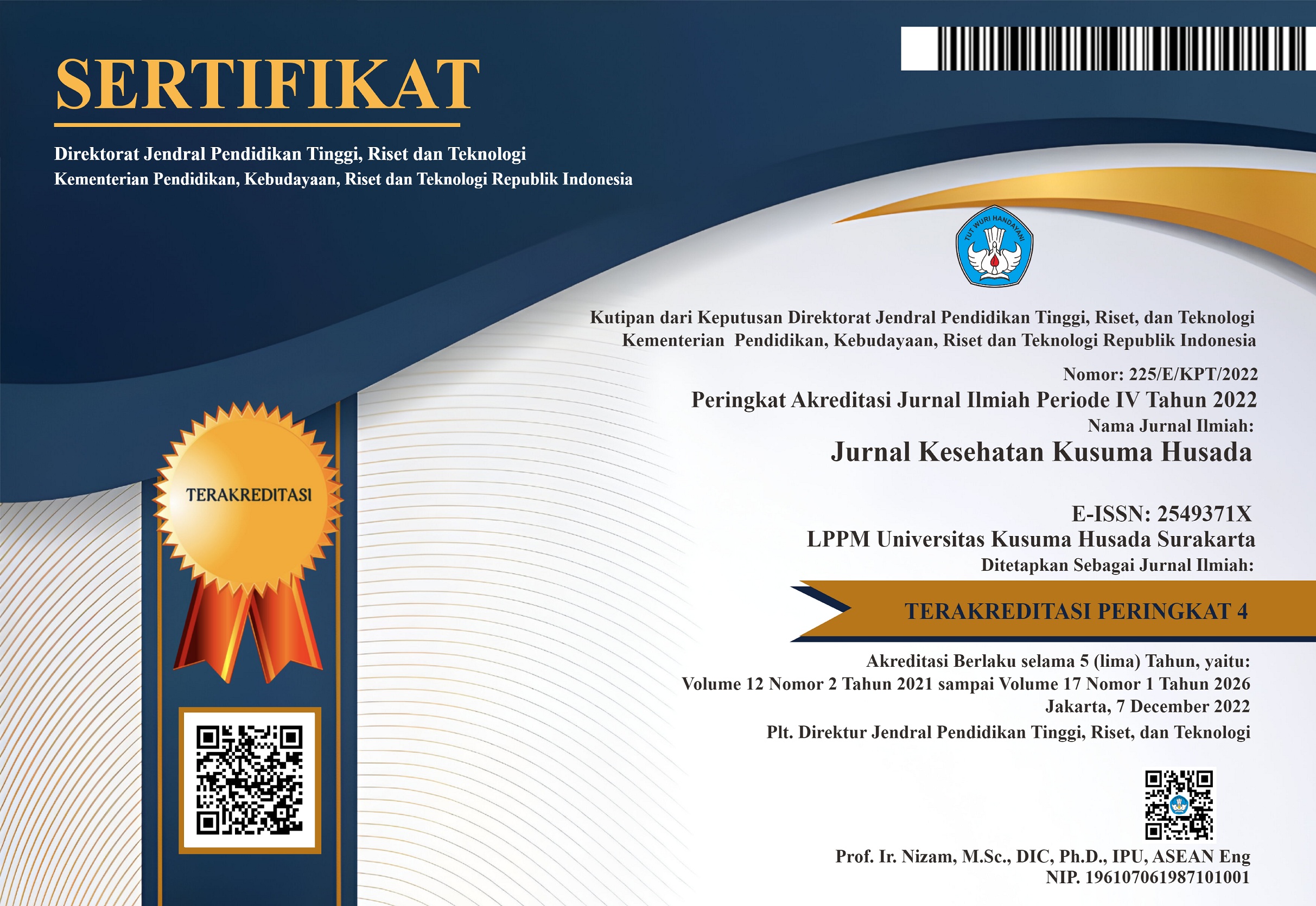COGNITIVE BEHAVIORAL THERAPY (CBT) TERHADAP STIGMA DIRI, HARGA DIRI DAN KUALITAS HIDUP PASIEN TBC
Abstract
Cognitive Behavioral Therapy (CBT) merupakan salah satu bentuk terapi yang bertujuan untuk membantu individu melatih cara berpikir maupun fungsi kognitif dengan cara memperbaiki pikiran disfungsional dan perilaku serta perasaan yang timbul akibat pikiran tersebut. Penyakit TBC mempengaruhi semua domain kualitas hidup pasien antara lain penurunan kualitas hidup yang berkaitan harga diri khususnya pada komponen mental diantaranya stigmasi sosial, berkurangnya kapasitas untuk bekerja, dan masalah psikologis. Stigma terhadap penyakit TBC dapat berakibat tekanan emosional sehingga pasien TBC menunda pengobatan atau tidak patuh minum obat. Tujuan penelitian mengetahui gambaran stigma diri, harga diri dan kualitas hidup pasien TBC setelah memperoleh pendekatan CBT. Desain penelitian menggunakan Quasi Experimental Design dengan rancangan Pre Test – Post Test Control Group Design. Tempat penelitian Desa Mojosongo, Surakarta mulai bulan September 2021 hingga Maret 2022. Subjek sebanyak 60 secara totally sampling dengan variabel independen adalah metode CBT sedangkan variabel terikat yaitu stigma diri, harga diri dan kualitas hidup pasien TBC berdasarkan skala ukur tiap parameter. Hasil analisis uji univariat menunjukkan pengaruh CBT terhadap stigma diri pasien TBC pada pre dan post kelompok perlakuan terbanyak kategori sedang; sedangkan prosentase nilai harga diri dan kualitas hidup pasien pada pre kelompok perlakuan terbanyak kategori sedang dan post kelompok perlakuan terbanyak kategori tinggi. Hasil analisis uji bivariat menunjukkan p-value 0.000 sehingga CBT berpengaruh terhadap stigma diri, harga diri dan kualitas hidup pada pasien TBC dibandingkan dengan kontrol. Kesimpulan: adanya pengaruh signifikan pemberian CBT terhadap stigma diri, harga diri dan kualitas hidup pada pasien TBC.
Cognitive Behavioral Therapy (CBT) is a form of therapy that aims to help individuals train their way of thinking and cognitive function by correcting dysfunctional thoughts and behaviors and feelings that arise as a result of these thoughts. TB disease affects all domains of patient's quality of life, including a decrease in quality of life related to self-esteem, especially in the mental component including social stigma, reduced capacity to work, and psychological problems. Stigma against TB disease can result in emotional stress so that TB patients delay treatment or do not comply with taking medication. The purpose of the study was to determine the description of self-stigma, self-esteem and quality of life of TB patients after receiving the CBT approach. The research design used Quasi Experimental Design with Pre Test – Post Test Control Group Design. The research site is Mojosongo Village, Surakarta from September 2021 to March 2022. Totally sampling 60 subjects with the independent variable being the CBT method while the dependent variable is self-stigma, self-esteem and quality of life of TB patients based on the measuring scale of each parameter. The results of the univariate test analysis showed that the effect of CBT on the self-stigma of TB patients in pre and post treatment groups was mostly in the moderate category; while the percentage of self-esteem and quality of life of patients in the pre-treatment group was in the medium category and the post-treatment group was in the high category. The results of the bivariate test analysis showed a p-value of 0.000 so that CBT had an effect on self-stigma, self-esteem and quality of life in TB patients compared to controls. Conclusion: there is a significant effect of giving CBT on self-stigma, self-esteem and quality of life in TB patients.
Copyright (c) 2022 Jurnal Kesehatan Kusuma Husada

This work is licensed under a Creative Commons Attribution 4.0 International License.
The copyright of the published articles belongs to Jurnal Kesehatan Kusuma Husada.

This work is licensed under a Creative Commons Attribution 4.0 International License.











